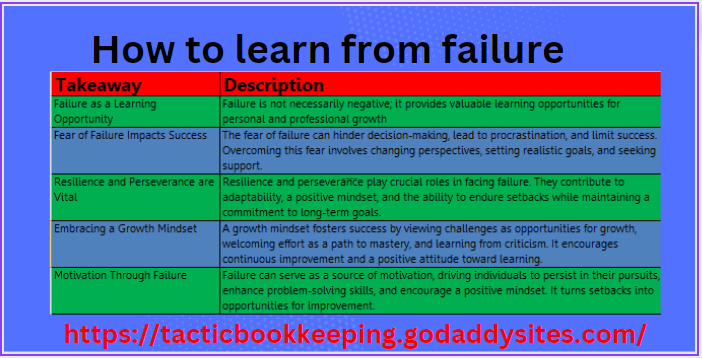When it comes to achieving success, failure is often seen as something to be avoided at all costs. Mistakes and setbacks are seen as big red X’s on our journey to greatness. However, what if I told you that failure is not the end of the road, but instead a valuable stepping stone towards personal and professional growth? In this blog post, we will explore the concept of learning from failure and how it can help us transform setbacks into opportunities.
Growing up, I always had a fear of failure. I was taught that failure meant disappointment, shame, and a lack of worth. So naturally, I would do everything I could to avoid making mistakes. I would carefully calculate my every move, avoiding any situation that posed a risk of failure. But what I didn’t realize is that by doing so, I was limiting myself and missing out on valuable learning opportunities.
It was during my early years in college that I had my first taste of failure. I had poured my heart and soul into a project and was devastated when it didn’t turn out as planned. I remember feeling defeated and questioning my abilities. However, in the midst of my despair, I had a realization. Failure is not the end; it is merely a detour on the path to success.
Through this experience, I learned that failure should not define our worth or capabilities. Instead, it should be seen as a necessary part of the learning process. After all, how can we grow and improve if we don’t make mistakes and learn from them? It’s the moments of failure that challenge us, push us out of our comfort zones, and ultimately help us become better versions of ourselves.
One of the keys to learning from failure is adopting a growth mindset. Instead of viewing setbacks as a reflection of our abilities, we should see them as opportunities for growth and development. This mindset shift allows us to approach failure with curiosity and a willingness to learn from our mistakes. It’s about understanding that failure is not a personal flaw but a chance to gain new insights, refine our skills, and try again.
Another important aspect of learning from failure is self-reflection. When we experience setbacks, it’s crucial to take a step back and critically analyze what went wrong. Was it a lack of preparation? Did we take unnecessary risks? By examining our failures with an objective and discerning eye, we can identify patterns, weaknesses, and areas for improvement.
However, self-reflection alone is not enough. It’s equally important to seek feedback from others. Seeking different perspectives and insights can provide us with valuable information that we may have missed on our own. Humbling ourselves and being open to constructive criticism allows us to learn from our failures more comprehensively.
Learning from failure also requires resilience. Setbacks can be emotionally challenging, and it’s easy to become discouraged and give up. But it’s in these moments that resilience becomes a powerful ally. By building resilience, we develop the ability to bounce back from failures and setbacks, even stronger than before. It allows us to view failures as temporary obstacles rather than permanent roadblocks.
Finally, learning from failure involves perseverance and a willingness to keep trying. It’s about understanding that success is not an overnight achievement but a journey filled with ups and downs. Embracing the process and persevering through failures is what truly separates those who succeed from those who give up.
In conclusion, failure should be seen as an opportunity for growth, not as a roadblock to success. By changing our mindset, embracing self-reflection, seeking feedback, building resilience, and persevering through setbacks, we can learn from failure and transform it into a catalyst for personal and professional growth. So let us not fear failure, but instead, embrace it as a necessary stepping stone on our path to greatness.
